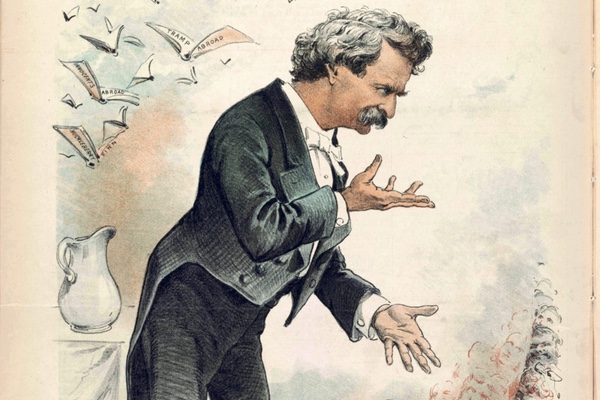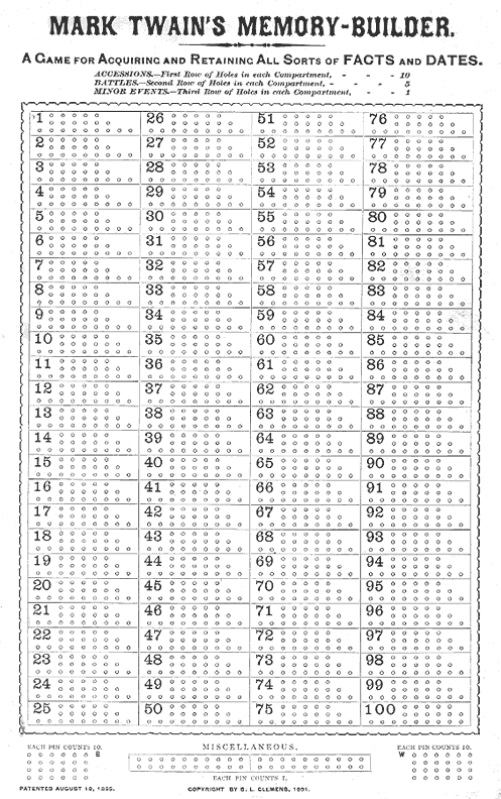NYT History Book Reviews: Who Got Noticed this Week?

The New York Times was first issued in 1881, three years before The Adventures of Huckleberry Finn, a novel by Mark Twain, was first published in the United Kingdom in 1884. In a recent Sunday Book Review addition on the NYT website, two publications were reviewed, 'Mark Twain's America' and 'Huck Finn's America.'
Brenda Wineapple, the reviewer selected by the NYT, is the recipient of an exotic name, and the author of Ecstatic Nation: Confidence, Crisis, and Compromise, 1848-1877.
Why was she chosen for the assignment? She was likely chosen because of her accolades as a biographer herself, and the fact that she has received star-studded reviews of her books from the NYT and the WSJ, respectively.
The first of the two: Mark Twain's America, A Celebration in Words and Images by Harry Katz, a former Library of Congress curator, and the Library of Congress, was published this year by Little, Brown and Company. The national library is listed as a co-author in acknowledgement of its staffers’ work researching, editing, and fact-checking the text.
It features illustrations, vintage photographs, caricatures, cartoons, maps, and other memorabilia that the Library of Congress specializes in up keeping. Lewis Lapham also provided the foreword for this book, writing about Twain’s early years and the Mississippi River, a landmark with a powerful influence on Twain as a person and as a writer.
Controversial aspects of the book:
In the third paragraph of Wineapple's review, she notes that:
"Since its publication, “Mark Twain’s America” has come under criticism for what some Twain specialists say are a number of errors and missing or inaccurate attributions, and the Library of Congress recently issued a statement pledging “to correct resulting problems” in any forthcoming editions."
What she is referring to is what's been referred to as a plagiarism scandal which was brought to the public's attention by Kevin Mac Donnell, a Twain scholar, in a scathing review in November of last year on The Mark Twain Forum.
She stated, however, that "the book is more notable for its many visual documents than the facts of Twain’s life, which are readily available elsewhere."
Let's examine the accusations of inaccuracy and copyright infringements:
Daniel Hernandez, a journalist working for Quartz, pointed out that a photo purporting to show the author’s home in Hartford was, in fact, a picture of a house Twain never lived in. Wineapple's comment about the greater value of the visual documents is void, in this case, since the book's factual errors also apply to its photographic contents, and at a significant rate.
"This coffee-table book includes images of at least forty-five steamboats, but not a single one of the twelve that were piloted by Mark Twain, even though images of nine of those vessels do exist. This failure to connect the dots between Mark Twain and his America is a recurrent problem throughout the entire book," Mac Donnell said.
"The book has the feel of something hastily cut and pasted together, a derivative cobbling together of facts and images."
Mac Donnell cut no corners in his examination of the book's memorabilia, proceeding to give it an "F" grade. Fifteen days after publication of this article, Gayle Osterberg, the Director of Communications, on behalf of the Library of Congress, wrote in an apology:
"The Library has determined and deeply regrets that its regular and rigorous review protocols were not followed in the editing of this publication. We are identifying where and how these processes broke down in this instance and implementing measures to ensure an egregious lapse of this nature does not occur again."
In response to these allegations, Harry Katz, along with the book's editor, Tom Wiener, also wrote to the Forum, expressing regret for mistakenly omitted books and references in the acknowledgements and bibliography section.
“Regarding factual errors, we deeply appreciate their being pointed out,” Katz and Wiener said. “We are generalist scholars and writers, but, like everyone on the Forum, we seek to be as accurate as possible in our work. We will rectify errors or omissions in forthcoming editions of the book. The review’s pointed criticisms speak to a deep passion for Twain, a passion we all share.”
Mac Donnell was not convinced that their response was genuine, to say the least. He responded with this message:
"What I see in that letter is a cautiously worded expression of regret, but not an apology. This reviewer does agree that this matter may be regarded merely as a situation in which a source was mistakenly omitted from [their] Bibliography and Acknowledgements. This 244p. book has perhaps 110pp. of actual text (excluding the copious = illustrations, the many extended quotes, the preface by James Billington, the foreword by Lewis Lapham, and the 8pp. index). In those approximately 110pp. are more than 100 factual errors and more than 400 sentences and phrases copied verbatim from at least four copyrighted sources (the source count has doubled since I wrote my review). Their letter concludes that the authors wish to move forward to make Twain book the very best it can be. This reviewer does not think a book so freighted with the intellectual property of others and burdened with so much misinformation can move forward at all."
The second book that was reviewed was Huck Finn's America: Mark Twain and the Era That Shaped His Masterpiece by Andrew Levy, who is also the author of the critically acclaimed Brain Wider Than the Sky, and the award-winning biography The First Emancipator. In this book, Levy shows how modern readers have been misunderstanding Huckleberry Finn for decades. The American literary classic is often painted as a coming-of-age adventure tale for children or a serious critique about race relations, yet Levy bargains that it is neither of these. Perhaps Huck Finn was not about civil rights, but about race's role in entertainment, commerce, and culture: similar roots and foundations which our consumerism-based lifestyle has been built upon.
Brenda Wineapple weighed in:
" ‘Huck Finn’s America’ unfortunately suffers from a surfeit of academic prose (Levy’s repeated use of ‘narrative” and “cultural strategies’ would doubtless set Twain’s teeth on edge). It also suffers from a surfeit of theories — some incontrovertible, some astute, some belabored."
"Levy obviously loves ‘Huck Finn’ but at the same time seems uncomfortable because he’s drawn to a book rife with racial slurs and unlikable caricatures. As a consequence, his discussion of Twain’s equivocal progressivism is a noble-hearted attempt to rescue as well as reproach a book saturated with ambivalence, which Levy rightly acknowledges as the legacy of Twain — and America."
Kevin Mac Donnell - the Mark Twain sleuth himself - said in his review of the book:
"[Levy] succeeds brilliantly by drawing together the large body of existing critical analysis of Mark Twain's masterpiece, brightening the beams of those insights by focusing them together, and then broadening the resulting illumination with flashes of insight of his own. The seasoned Mark Twain scholar will blink in pleasant surprise to see familiar themes in new ways, and the general reader may very well be blinded by the light. Every reader will appreciate Levy's graceful fluid writing style--free of scholarly jargon and peppered with elegant turns of phrase--that achieves an admirable level of concision and clarity."
The Bottom Line: Go with what Mac Donnell said. He knows his stuff on Mark Twain!
For Fun: In 1885 - the same year he was finalizing his manuscript for Huck Finn, Twain patented "Mark Twain's Memory-Builder," a board game that he created to improve the player's memory for facts and dates. In the game's instructions, Twain explained that the board represented any century but it also represented all centuries. Points are awarded for the correctly pinned year in a column.

Rules of the Game:
The first row, Accessions, (thrones, presidencies, transitions in rule) was worth 10 points. Second row: The dates of significant Battles (i.e. the Battle of Waterloo in 1815) are worth 5 points. The third row is for Minor Events, which are worth 1 point. Miscellaneous Facts are also weighed into the final score. "Anything that is worth remembering. Waste no opportunity to tell all you know," Twain instructs. Check out the board game here. Or, an alternative link, here.
For example, you stick a pin in 85 (third row of holes in compartment--"Minor Events"), and say "Mark Twain published "The Adventures of Huckleberry Finn" in 1885." You would receive one point, although the fact that Twain was a literary king who wrote a masterpiece might garner an "Accessions" exception.
If you have kids who aren't up to playing the Memory Game yet, (most children forget to keep track of their remedial chores), check out this Twain House coloring sheet template.